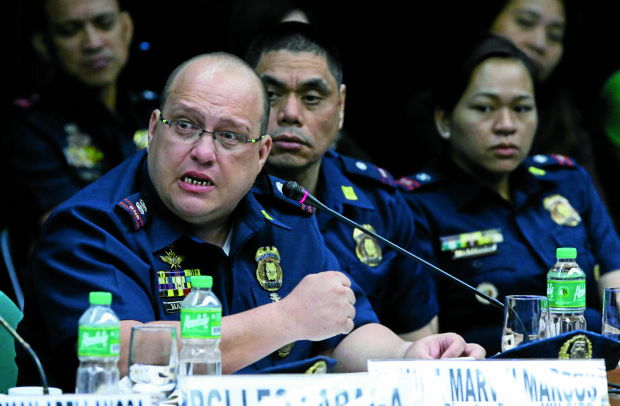Pardon cops? Not so fast, says mayor’s lawyer

CIDG Region 8 Director Marvin Marcos during the Committee on Public Order and Dangerous Drugs Joint with the Committee on Justice and Human Right probe on killing Albuera Mayor Rolando Espinosa Sr. at the Session Hall of Senate, Pasay City. INQUIRER PHOTO / RICHARD A. REYES
TACLOBAN CITY — The country’s snail-paced judicial process could dash hopes of an early presidential pardon for the policemen accused of killing Albuera, Leyte, Mayor Rolando Espinosa Sr. in his jail cell, the legal counsel of the slain official’s family said on Friday.
Lawyer Leilani Villarino said the trial of the case might outlast the term of President Duterte because justice in the country grinds so slow.
“We’ll see what will be the verdict of the court and if Mr. Duterte is still the President. How can he pardon them if he is no longer the President at that time?” Villarino said in a phone interview.
The President, who is waging a controversial and brutal war on drugs, is supposed to step down in 2022.
Speaking in Oriental Mindoro on Wednesday, Mr. Duterte vowed to grant presidential pardon to police officers who would be convicted of crimes for following orders related to his antinarcotics campaign.
Article continues after this advertisementHis statement came in the wake of the arrest and detention of 19 members of the Criminal Investigation and Detection Group (CIDG) in Eastern Visayas for the murder of Espinosa, father of the region’s top drug lord, Kerwin Espinosa.
Article continues after this advertisementAccused of murder were former CIDG-8 director Supt. Marvin Marcos and 18 others who all claimed that Espinosa and another detainee, Raul Yap, were killed in a shootout with officers who raided their cells in search of weapons and drugs last November.
Without referring directly to the Leyte case or naming them, Mr. Duterte came to the defense of the officers.
“Whom do I believe? The witnesses who are inmates or my police? My police. Now, they have been charged with murder. I will support them. No problem,” Mr. Duterte said on Wednesday.
Mr. Duterte said the police officers could skip trial and plead guilty, and he would then give them absolute pardon.
He added that this power was given to the President by the Constitution, and the grant of pardon was his “only weapon … against harassment against government men.”
On Friday, presidential spokesperson Ernesto Abella said the President’s statement on the pardon should not be taken to mean “as a condonation, as a blanket condonation of criminal acts” by police officers.
Mr. Duterte’s promise to grant pardon, Abella said, was a “statement of a superior standing by his own directive regarding specific operations.”
Police officers who commit criminal acts would have to face investigation and would be entitled to due process, he said.
“So legal procedures would be strictly observed without presidential intervention,” he said.
Asked to state categorically if Mr. Duterte was set to pardon Marcos and the other police officers, Abella said he did not know, but cited the President pledged to support them.
“He did say that he will stand by them, right?” Abella told reporters.
Marcos and his coaccused are detained at the CIDG-8 regional office in this city.
Reporters were barred from entering the office, triggering speculations that the accused were receiving special treatment for being part of the regional CIDG unit.
Villarino said they could not question any presidential pardon that may be granted to Marcos and the others.
“The process of pardon is granted to our President under our Constitution, but there should be a parameter before he could issue such. For one, there should be conviction,” she said.
“How could they be pardoned by the President if there is no conviction from the court of competent jurisdiction?” Villarino said.
She said that when Mr. Duterte issued the statement, he could have been speaking as a lawyer.
“He was just [being] rational. But in fairness to the President, he has not done anything that could prejudice the case,” she said.
Still, Villarino said, the victim’s family was sad and demanded justice, “just like any family whose loved one was murdered.” —WITH A REPORT FROM LEILA B. SALAVERRIA